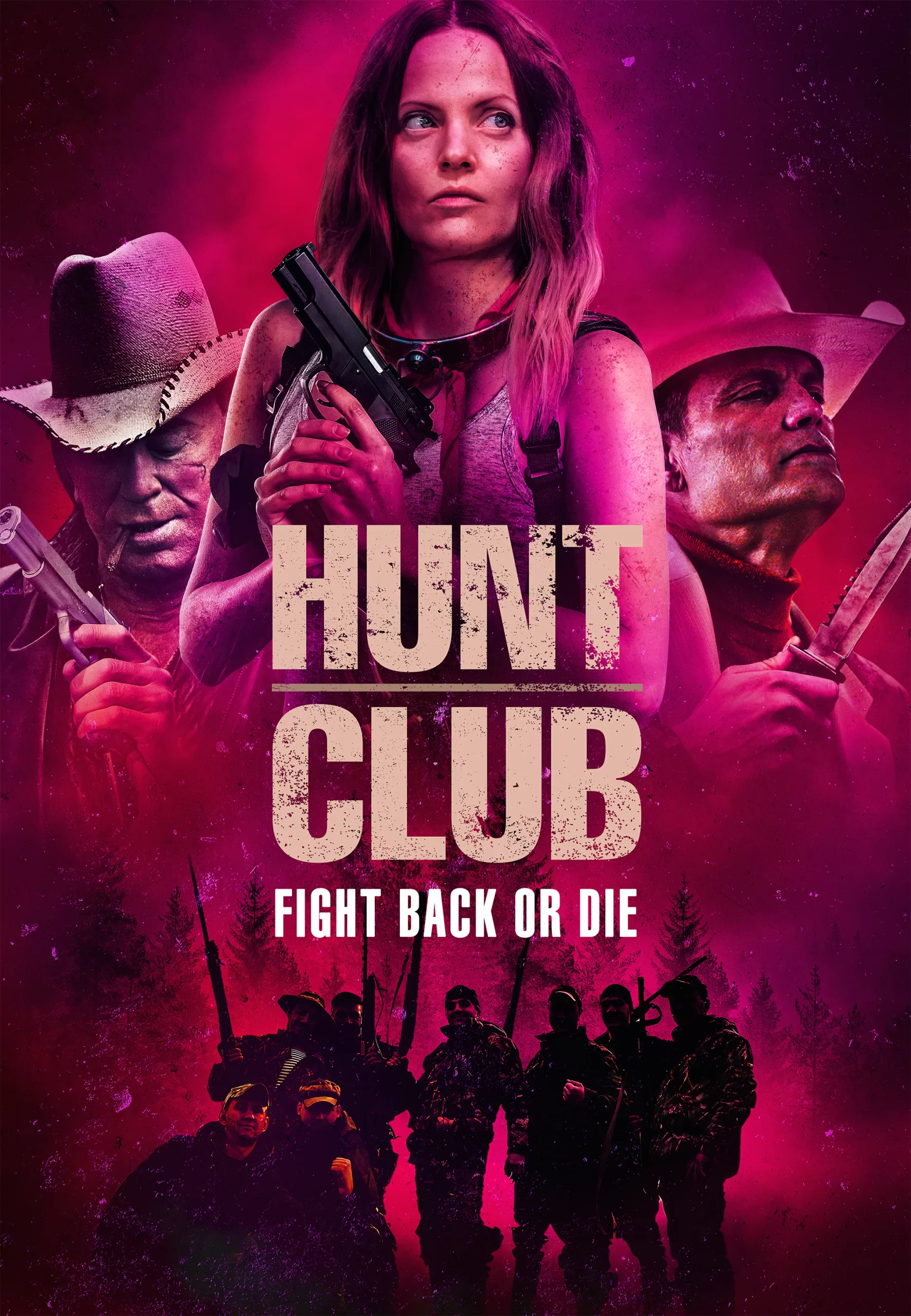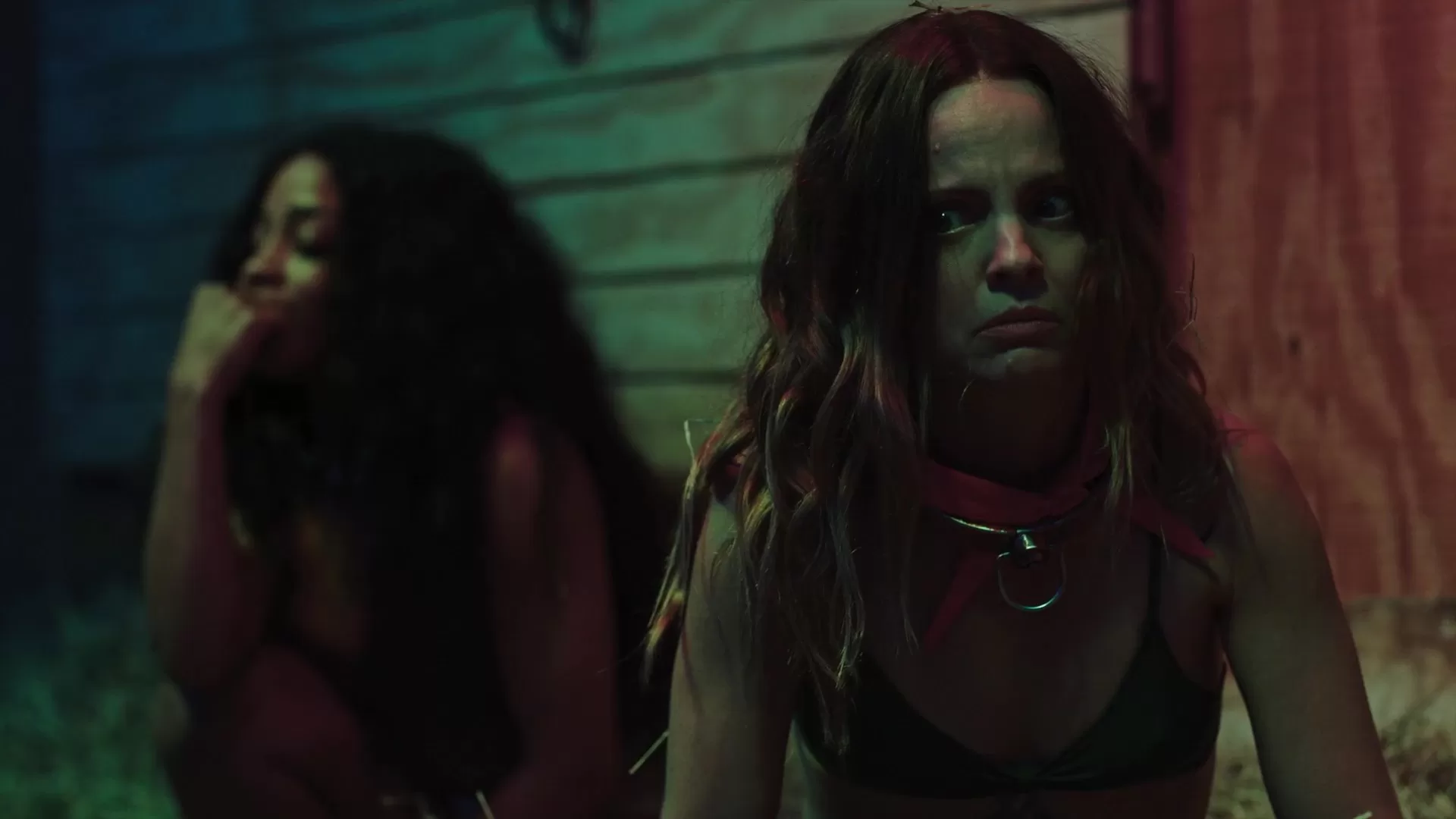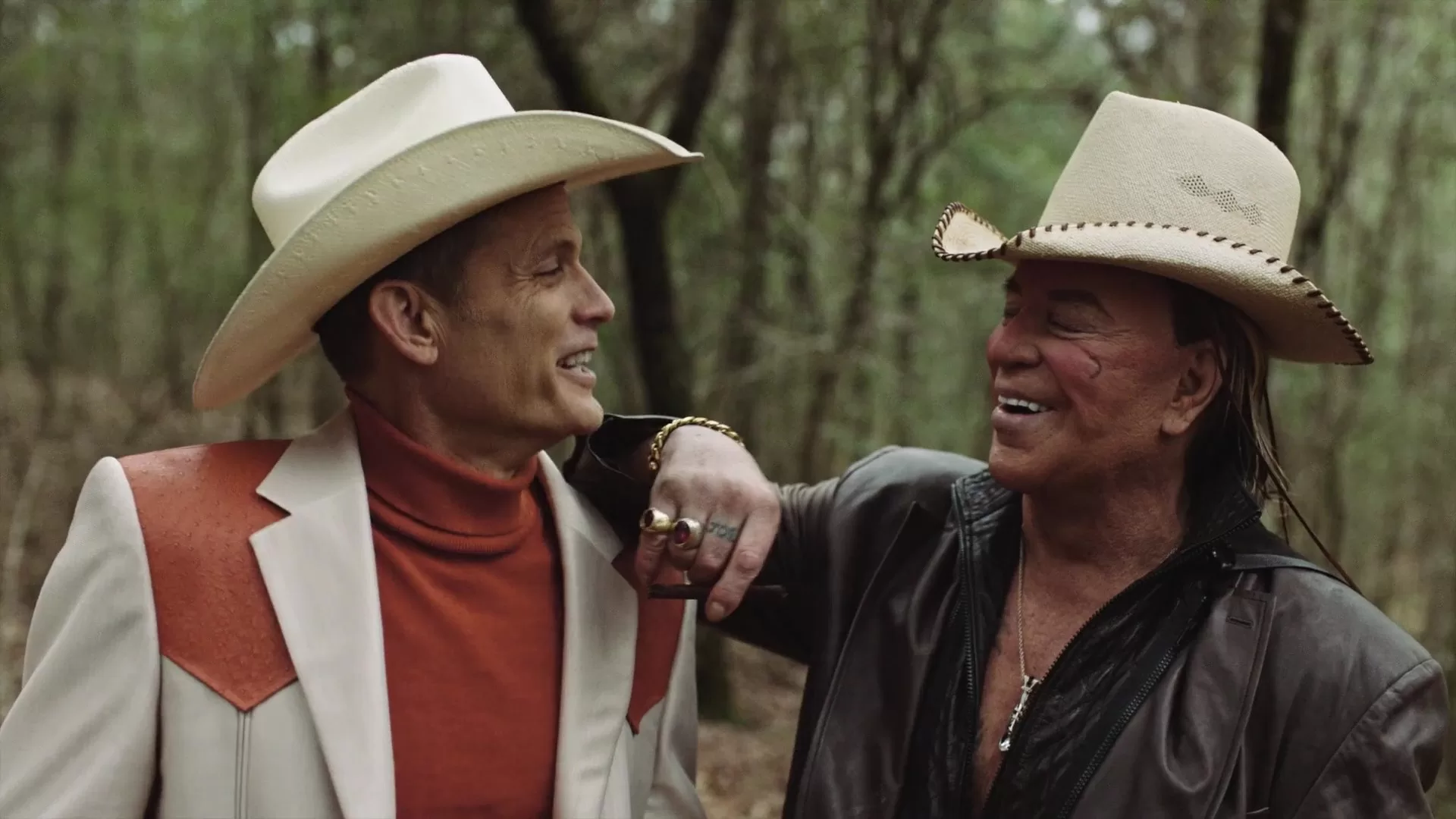In a case of a solid premise but awful execution, Hunt Club is a film that ultimately falls flat by lacking a coherent vision. A tensive tale about women’s survival and subsequent retaliation against the rich white men taking pride in hunting them for sport, the film ultimately falls flat as both an indie and a B-quality horror flick in regards to its distasteful handling of the subject material. It is a movie that tries to break bad against abusive men and male-gazey filmmaking by unironically reenacting the genre it means to condemn.
A shame… as there might have been a potential indie breakout here.
Initially announced by The Hollywood Reporter, the film features a handful of stars in its cast with Mena Suvari as Cassandra, Maya Stojan playing her badass girlfriend, and then Casper Van Dien and Mickey Rourke acting as the movie’s villains.
The movie follows the story of Cassandra (Suvari), a grieving mother on a self-destructive life path rescued by a woman named Tessa (Stojan). Per luck, she finds herself in a strange encounter with two men and a financial offer: $100,000 if she takes part in a hunt in a remote area.
Accepting the risk, she soon finds herself captured along with several women whose terrible life circumstances have also made them strapped for cash. The women are to serve as prey for the hunters, revealed to be a toxic group of misogynistic Alpha-Male dude-bros who are a little more than a fraternity of privileged white men with power complexes.

The Good
First, let’s talk about the positives. Like any good survival against all odds story, the heart of this film is in its inevitable turn when the women finally get their revenge. It’s short but satisfying and they’re glimpses of fine emotional performances from Mena Suvari, along with some kick-ass scenes from Maya Stojan’s Tessa.
The one nice thing about this movie is that the women aren’t just props. They’re well-rounded characters with surprisingly showcased backstories. Women who were trying to find their own empowerment, though who ultimately, were all taken advantage of in terms of getting put into this hunt. Cassandra’s character likewise, has a solid tale about a mother trying to escape while delving into her past with her daughter and partner.
The Bad
Still, fair warning, these revelations don’t really occur until the turn into the second half. The hunt, not really kicking off until the movie’s final act, as the midpoint, for some strange reason, focuses on Casper Van Dien’s character, Carter. Who makes a big speech about the primal power of masculinity? How empowering it feels to be a man on the hunt…
Against. Defenseless. Women…
Which is where the movie absolutely crashes.
These men, while villainous for the story’s sake, are incredibly poorly-written caricatures of toxic masculinity. Most of them are white, come from privilege, and then conveniently like to make long-winded speeches about how much they hate that culture has changed, “Back in my day, a man was this…” many times throughout this film.
The problem is that the villains of the story are lacking any sort of layers and are so distant from the characters that it’s a classic case of us-versus-them. Despite how it’s a well-known fact that most sexual offenses aren’t by strangers but by someone within their immediate circle. Why there’s so little context makes for an easier-to-digest enemy, yet, also feels like it’s slightly pandering. Though to whom, I’m not sure because this production? Absolutely caters to the male gaze in a misplaced homage to the slasher genre trope, where the women in this movie are unnecessarily clad in their underwear this entire time.
It should be noted that the writing team was accredited to two men, David Lipper and John Saunders, who spend the majority of the movie talking about women’s disempowerment despite that neither of the screenwriters are women.
The problem is that the movie poorly addresses rape.
 Sumayyah Ameerah and Mena Suvari in The Hunt Club
Sumayyah Ameerah and Mena Suvari in The Hunt Club
There’s a prostitute in the movie who leads the movie’s tertiary C-Plot. A woman whose actions are later revealed, to be motivated by uncomfortable consent for money, and then switches into non-consensual. Like the rest of the women in the movie, she essentially wants revenge for what’s happened to her, particularly over being violently raped (offscreen). Ultimately, her story beats turn at the blink of an eye in a whiplash of tonal shifts that make us all wonder: why is this even a part of the movie?
Now, director Blake-Thomas is no stranger to directing movies about sex trafficking, which is why I’m assuming ‘Hunt Club’ gets into this territory. Yet, the storyline contributes to absolutely nothing and feels uncomfortably exploitative outside of implied torture and a forced-Greek mythology theme that had to be spoon-fed, via very painful and out-of-place dialogue, several times throughout the film.
Ultimately, keeping these moments within the film hurts the tone of the events happening more than helps, as it makes the movie fall more in line with the controversial rape-revenge horror genre such as The Last House on The Left say as compared to The Most Dangerous Game. It also… has absolutely nothing to do with Cassandra’s journey nor is it connected to the film in any essential way.
So why is rape even a side plot point of the movie in the first place?
The Production Doesn’t Fare Much Better

The Hunt itself is talked about more than actually displayed in this movie, perhaps for budgetary reasons, though, a lot for the sake of showcasing toxic masculinity.
Atop of this, the movie is littered with less-than-stellar action sequences that feature more aftermath cutaways rather than actual hunting minus a few stunts from actress Maya Stojan. This is a B-movie, though not a particularly fun one in terms of its directing, and at times: both lighting and keyframing—as there are a lot of extreme close-ups in this movie.
On the one hand, on paper, the beats of this tale should make for a compelling and positive script. A harrowing tale about revenge for women flipping the script on all of the predatory men. Picture the Oscar-award-winning Room but with B-Rate survivalist undertones, almost like a, You’re Next though lacking the surprising twists of the ‘growing up in a survivalist compound’ backstory—just being a woman was enough to be a badass.
Yet, the movie falls short in many aspects of these vaunted goals. Carter (Van Dien) plays a single-toned bad guy whom we can’t help but root for their downfall. Mickey Rourke plays yet another enforcer type meant to be overcome. The women get their revenge. The mid-sections are filled with aftermath deaths (there are actually very few exceptions in this movie). Oh, and there’s a redemption story for Carter’s son Jackson—who gets into a weirdly not intimate but close relationship with Cassandra. The explorations of which throughout the movie also feel… pretty in poor taste.
Still, weirdly, the most cringeworthy moment of this film was less about the film itself than what it was lacking. As there was a startling amount of white people in it. Minus one token black character, almost everyone in this movie was white—which kind of did disturb me as a person of color. Something which I don’t always point out but in this case, absolutely felt like I had to. In a strange way, this movie felt like something out of a Jordan Peele movie, minus almost all of the black people. Which is why it felt uncomfortable to watch.
The Take
As somebody who’s a writer, writes screenplays, and has friends in every facet of the industry, I don’t often give negative reviews as I understand how difficult it is to get things made. But when the film ended with what’s essential, a scene that rips off a bit of the ending to The Rise of Skywalker‘s final moments, I kind of knew this was going to be a bad review.
I’m conflicted here.
I like the movie’s ambitions as it feels like it was going for a great idea but just poorly executed minus a handful of saving graces from its cast. Whereas this could have been something like Room, or at the least, a women empowerment story of survival—a lot felt missing or distastefully addressed, lacking a coherent vision of what it was trying to say.
Which is more-or-less… Go, Women?! Down with the patriarchy?
I couldn’t tell you. Because I’m not entirely sure they were trying to say that either.
